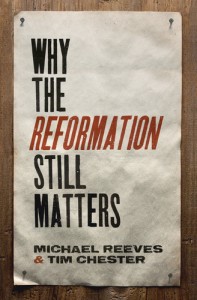Review of Why the Reformation Still Matters by Michael Reeves and Tim Chester
October 31, 2017 will be the 500th anniversary of the Protestant Reformation. (The “quingentesimus“, if you care about the fancy name for that particular anniversary.) As a result we have seen and will no doubt increasingly see a spate of books on the market celebrating or decrying the Reformers and the work God did through them. One of the best introductions to that reforming work so far is Why the Reformation Still Matters by Michael Reeves and Tim Chester.

So just why does the Reformation still matter? I’m not sure the Reformation matters nearly so much relative to Catholicism—most Americans (including most Roman Catholic Americans) know so little about the formal heresies propounded by Rome that there is little point to refuting them these days. Which isn’t to say the Catholic/Protestant debate has gone away—just that it’s not necessarily at the forefront of anybody’s mind. Those who have witnessed to American Roman Catholics have found that very often the person they’re talking to knows so little about Catholicism proper that the Gospel is not primarily offensive because it stands in opposition to Rome. If we were presented with a robust and informed Catholicism that held heavily to traditional doctrines, then we would all be well-served by taking up Calvin’s Antidote to the Council of Trent and familiarizing ourselves with its arguments. Instead, we find ourselves in a time similar to that described by Bunyan’s Pilgrim, who comes across the caves of Pope and Pagan at the end of the Valley of the Shadow of Death:
“Now I saw in my dream, that at the end of this valley lay blood, bones, ashes, and mangled bodies of men, even of pilgrims that had gone this way formerly: and while I was musing what should be the reason, I espied a little before me a cave, where two giants, POPE and PAGAN, dwelt in old time, by whose power and tyranny, the men whose bones, blood, ashes, etc., lay there, were cruelly put to death. But by this place CHRISTIAN went without much danger; whereat I somewhat wondered. But I have learnt since, that PAGAN had been dead many a day; and as for the other, though he be yet alive, he is, by reason of age, and also of the many shrewd brushes that he met with in his younger days, grown so crazy and stiff in his joints, that he can now do little more than sit in his cave’s mouth grinning at pilgrims as they go by, and biting his nails, because he cannot come at them.” (Pilgrim’s Progress, 72)
True, there has been some stirring in the bones of both Pope and Pagan, these days. But by and large the Roman Catholicism most of us will encounter on the street is little more than a loosely-theistic reflection of the reigning cultural ideology. Which means that the declaration of justification by faith alone as opposed to belief in purgatory and the efficacy of the sacraments is going to be less applicable to most of us.*
Fortunately, Reeves and Chester don’t spend much time on that—the Reformation is important not just for the correction of doctrine and reorientation of the church on the Gospel in the 1500s, but also for the challenge it presents us today. In an age when most Americans are completely uninterested in anything that isn’t happening right now, it is useful to have a reminder that there is great wisdom and holiness in the past that can guide us and provide us with a model to how we ought to think and live in our own time.
And if I were to stop there, all I would have done is provided a good traditionalist argument for studying the past—there are great people and great ideas that we ought to be familiar with and try to emulate. But the Reformers are no mere Ciceros are Senecas or Socrateses. They, like their Patristic predecessors and their Revivalist heirs, matter “because eternal life still matters.” (18) To take just one example:
“Nothing matters more than justification by Christ alone through faith alone. If justification by faith seems obvious to you, then it is because of Luther. But we must not presume on his legacy.
Many attempts have been made to move the center ground of Christianity elsewhere. But the fact remains that the biggest problem facing humanity is God’s justice. God is committed to judging sin. And that means he is committed to judging my sin. This is our biggest problem because that means an eternity excluded from the glory of God.” (34)
The conservative in me begs modern Americans to take up a good book written prior to the 20th century and immerse yourself in it; but as a Christian I know it’s far more important that we hear that we are sinners who have angered God and that the only means of reconciliation is through the atonement made by Christ on the cross. The Reformers say that as clearly and as well as anyone before or since. Reeves and Chester have given us an excellent and readable survey of Reformation thought that introduces the key doctrines of the faith and explains why they matter.
If Why the Reformation Still Matters has a major weakness, it is that it focuses nearly exclusively on Martin Luther and (to a lesser extent) John Calvin—with only a minor aside for the anabaptists (their thoughts on the church) and the occasional mention of individuals like Richard Sibbes. In one sense this is perfectly appropriate. If the point of the book is to argue why the Reformation still matters relative to the deficiencies of our modern faith and practice, then Luther and Calvin really do give us all the necessary doctrines that concern Christian life and belief. If the point is to give us a sense of the breadth and depth of the Reformation, then more about the English, Swiss, and Anabaptist Reformers would have been a helpful addition (maybe for a second volume—More Reasons Why the Reformation Still Matters, or something along those lines?).
Even with that limitation, Why the Reformation Still Matters is an excellent book and well worth your attention.
*There are of course exceptions—for example, I spent seven years as a grad student at The Catholic University of America, where there were some better-informed Catholics. Even there, however, the majority of the Catholics (particularly undergraduates) I encountered were largely ignorant of the basic history and doctrines of their own faith. I do not think this was so much a failure of the school as it was a reflection on the state of contemporary American Catholicism.
This book was provided for free by the publisher on the condition that I write a review. I was not required to write a positive one.
Dr. Coyle Neal is an Assistant Professor of Political Science at Southwest Baptist University and co-host of the City of Man podcast (also available on iTunes). He lives in Bolivar, MO., where he daily resists the temptation to nail things to random doors around town.













